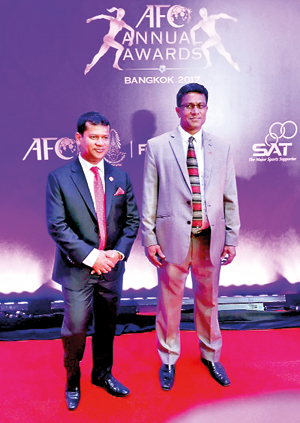Can constitutional reform help sports such as football?
View(s): Recent reports that the IOC is urging the NOCSL to engage the Ministry of Sports in amending the Sports Law and Regulations governing Sports, making it compatible with the principles that govern world sports, as defined by the Olympic Movement, reverberates across corridors of many Sports organisations. In step with the IOC comes the news that FIFA delegates are in Colombo to guide and propel the FFSL in its long delayed constitutional reform that is designed to bring it in line with an international template that FIFA is pursuing! This no doubt has far reaching consequences for FFSL and this island nation, that for long has been ensconced in its own small-minded dalliance, with an archaic structure that cannot decipher the woods for the trees! So, a measured imposition is perhaps necessary and the support of the NOCSL in this exercise will help the FFSL (and other Sports associations) make the long march forward!
Recent reports that the IOC is urging the NOCSL to engage the Ministry of Sports in amending the Sports Law and Regulations governing Sports, making it compatible with the principles that govern world sports, as defined by the Olympic Movement, reverberates across corridors of many Sports organisations. In step with the IOC comes the news that FIFA delegates are in Colombo to guide and propel the FFSL in its long delayed constitutional reform that is designed to bring it in line with an international template that FIFA is pursuing! This no doubt has far reaching consequences for FFSL and this island nation, that for long has been ensconced in its own small-minded dalliance, with an archaic structure that cannot decipher the woods for the trees! So, a measured imposition is perhaps necessary and the support of the NOCSL in this exercise will help the FFSL (and other Sports associations) make the long march forward!
To an ordinary mind, the thought that constitutional change can bring about Sports development and refinement may seem far-fetched. But modern Sports, no doubt, must take into account the levers of change and the critical mechanisms that ensure representation of all key stakeholders and the commercial implications that they portend. Football falls slap bang into this vortex because of its universal appeal. In an environment such as in Sri Lanka, dealing with the Regional Leagues will be one of its major challenges and something that will need to be managed with more than a modicum of tact and rational intent. Football, like most other Sports, still lingers in the honorary capacities of officials who emerge from the regional enclaves. With that ascendency comes the lure of money and a host of benefits that far surpass the wildest dreams of most Football officials. The examples we have in this tiny island are aplenty, and the pampering of FIFA and AFC must perhaps be taken into account, when the constitutional framework finally comes into the goal mouth!
The other mammoth challenge is the economic status of the direct Football stakeholders. It is a well-known fact that what we have in this country are teams, not clubs, built around small time businessman and a handful of wealthy entrepreneurs, who have hardly kicked a Football, but stumbled on the Sport by accident. These are the examples that we have left behind for those taking office to emulate, and that, in itself, is a mountain to negotiate! The glory that international Football confers is immense, and once the entry is made into the inner sanctums of Football House, the next destinations are the rarified edifices of international stadia, the infinite poses with world superstars and the voracious fine-dining with Football stars in the capitals of the world! Very little time is spent developing the local network and the young players, who are the real men who prop the Sport, so the mandarins can bask in their unfettered glory. How a constitutional reform process deals with this gravy train, is a question that must be asked boldly? Without solid answers, we will only get more of what is sinful!
So, constitutional reforms must come, but for what purpose? What will it fulfill? Is the budding footballer going to have a bigger stake in his destiny? Can he help shape the future of the sport and enjoy the wellbeing and prosperity it must bring for him and his family? How does the largesse of the godfathers filter down to the youngest most-talented footballer? The FIFA advisors would have hopefully gone beyond the confines of FFSL Headquarters, to go meet the boys in the provinces and see where Football is played, and where the teams and their clubs abound. Only then will they come to grips with the constitution-making; reforms that will bring real benefit to the people who matter!


